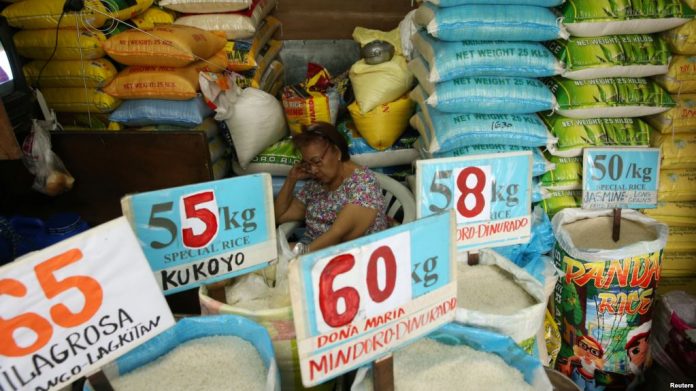
MANILA – The Department of Agriculture (DA) will launch today, October 27, its implementation of the suggested retail prices (SRP) and simplified labeling of rice on the market in Metro Manila and the greater Manila area.
The following rice labels and their corresponding SRPs (per kg) have officially been approved by the NFA Council:
- Imported well-milled – P39
- Premium imported (PG1) – P43
- Premium imported (PG2) – P40
- Local regular-milled – P39
- Local well-milled – P44
- Local premium grade – P47
- Special rice – no SRP
The official launch on Saturday will be held at the Commonwealth market in Quezon City.
However, the regulation will only be in effect among retailers in the Metro Manila and the greater Manila area as its implementation in other regions has yet to be approved.
Authorities will start imposing penalties 15 days after the regulation is published for general circulation. Violators are facing fines, license revocation, and even jail time.
According to Agriculture secretary Manny Piñol, retailer who violate the SRPs or labeling rules can face a fine of up to P1 million.
“The violations will also be covered by the Price Act, meaning if they sell fake dinorado or if they use the name sinandomeng when the actual rice being sold is not that variety, they will be covered by the Price Act. The penalty will be between P2,000 to P1 million,” he said.
The DA also appealed to the public for cooperation and understanding as they impose the new SRPs and labeling for rice.
“‘Yung special rice, for example, na Cordillera, they harvest only once a year. It’s a special rice variety. Gusto mong kumain ng masarap, mabango at talagang fancy [na] rice, you have to pay the price,” Piñol said.
“There was a spirited discussion…among stakeholders and there were calls for higher SRPs. But in the end, I explained to them, in the desire of this government right now is to make rice affordable to the people,” he added.
Purge gov’t lists
National Food Authority spokesperson Jerry Imperial earlier said that the government has also intensified its campaign against rice hoarding by creating an inter-agency task force composed of various government agencies including the NFA, Philippine National Police (PNP) and Department of Trade and Industry (DTI), among others.
The NFA spokesperson underscored the importance of the citizens’ participation in combating the issue of rice hoarding in the country.
Meanwhile, Ilocos Norte governor Imee Marcos said rice cartels in the country would not get dismantled by simply replacing import quotas with tariffs.
She said it would “still be business as usual” for the rice cartel because they control the underlying system and internal architecture of rice importation and distribution. “Their control of that system is not addressed by any of the bills on rice tariffication,” she added.
Instead, Marcos proposed that the government rosters of rice importers and traders must be purged of smugglers, economic saboteurs, hoarders, and tax evaders.
“Revoking their licenses and permits to import rice will deal a serious blow to the rice cartels,” she said.
Marcos lamented that rice cartels continue to operate with impunity because their identities remain hidden from the public.
“We are already in the 21st Century. It is time to bring those names out of the shadows through transparent and verifiable full disclosure on the website of the Department of Agriculture of the names, executives, and contact numbers and electronic records of all transaction details of all rice importers and traders, as well as their freight forwarders and warehouses,” the Ilocos Norte governor said.
She said the lists or registries of licensed or accredited rice importers and traders could not be immediately found on the front pages of the websites of the NFA, the Bureau of Plant Industry, Bureau of Customs, Department of Trade and Industry, and the Bureau of Internal Revenue,
Marcos said the last time the Department of Finance revealed the names of the companies, cooperatives, and other entities that import rice was way back in 2013.
She called for a rigorous vetting process, with the crucial involvement of civil society watchdog organizations, that will purge of the lists of rice importers and traders.
The Ilocos Norte governor also called for a detailed audit and forensic examination of all the processes and documents in the rice importation cycle. (GMA News)



